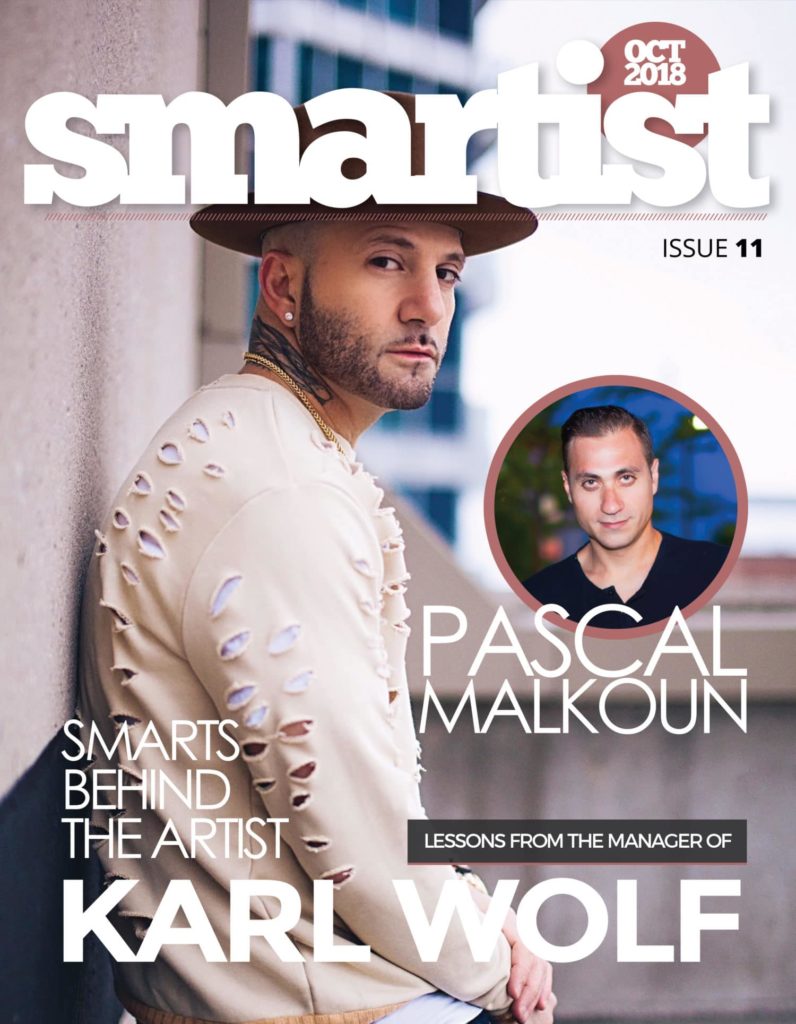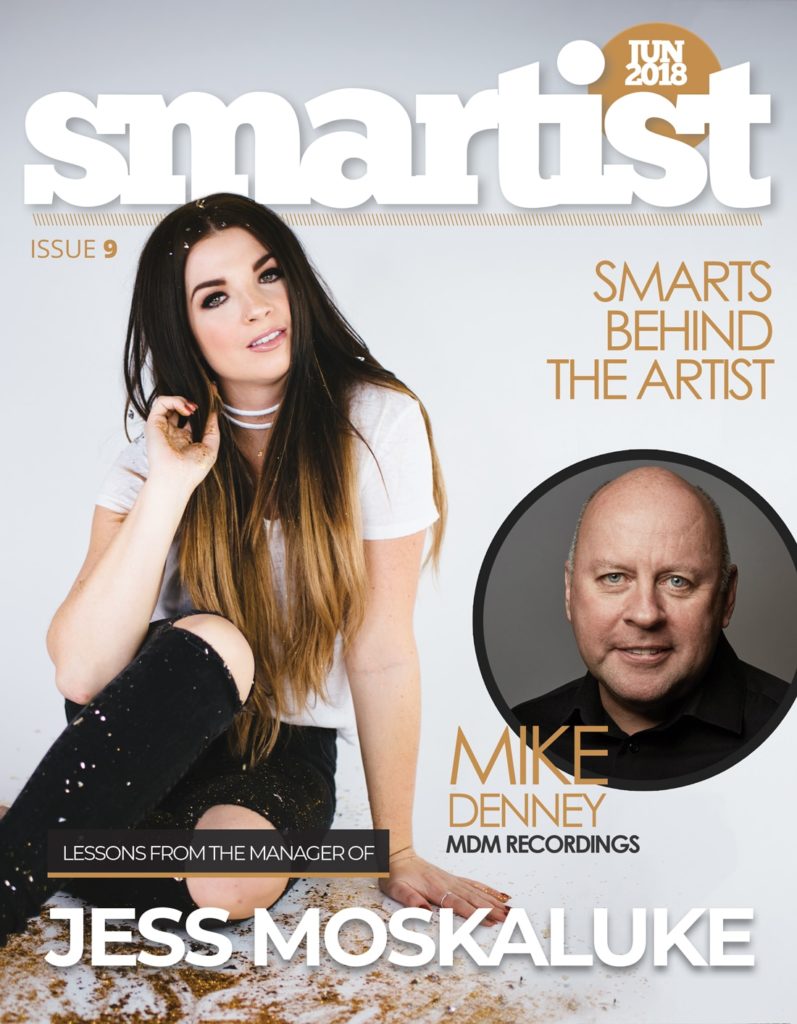How To Start An Artist Management Company

Are You Sure You Want To Start An Artist Management Company?
Being an artist manager is arguably one of the most exciting careers someone can have. Every day is different, it’s challenging, it’s rewarding, you get to witness the creative process, you get to help make someone’s dreams come true (or die trying), you get to travel a lot, you get to spend your time in recording studios, performance venues, attend festivals, and heck you get to drink on the job.
But, it’s not all mashed potatoes and gravy all the time so before we get into HOW to start an artist management company, I’m here to give you a little more insight on some challenges to overcome BEFORE starting an artist management company as well.
Warning, reality check ahead.
4 things to come to terms with before starting an artist management company
1. You HAVE to be patient
Every person I know with a successful company didn’t just start it up with tons of clients making money right off the hop. Unlike other industries or types of businesses, with artist management you can’t just register a business name, get a website, and start advertising your services. You don’t have an artist management company without artists. Plus, it takes a LONG … time … to build.
Most artist managers keep their full or part-time jobs for a long time until their artist roster is making enough money that they can quit. Depending on your artists success, this could happen quickly, or it may never happen. It all depends on what’s going on with your artist and if they’re making enough money. As their manager this lies heavily on you. If you have or find the right connections, and if your artist is talented enough (along with many other factors), you could be a full time artist manager before you know it.
I know a guy who quit his full-time salaried day job to start an artist management company with a couple of indie bands. A year later, he made absolutely no money, and lost 50% of his artist roster. Another year after that, he lost 100% of his roster and left the industry. Which brings me to my next point….
2. Have a back-up basket and carton of eggs
Sure, put all your eggs in one basket. But what if that basket breaks? You best be makin’ sure you’ve got another basket of eggs waiting for you. Relationships break. Artist managers loose artists regularly. Managers quit. Artists fire their managers. If you’re only managing one artist, make sure you have other sources of income coming in. Or make sure you have an ironclad agreement in place that will ensure you still get paid even if the relationship breaks. If you’re quitting your day-job to manage 3 acts you just signed at once, make sure you know exactly how much money they make, how much money you’ll make, and exactly when they’re going to be paying you. Or, have a massive reserve of money waiting in case they don’t.
Otherwise, you ain’t eatin’ no eggs.
3. Finding clients (artists) is like finding a spouse
Being an artist manager is like being in a marriage. It’s one of the closest relationships you’ll have next to your family members, and because of that, these relationships also take a long time to build. Sure there are some cases where an artist signs with a manager when they barely know each other (I’ve done it!). And sure there are some cases where people get married after 3 months of knowing each other. The reality is, though, that it’s a relationship built on mutual understanding, trust and loyalty, and generally that takes some time to build. So be patient in this arena too.
4. A company runs on money
We work in an industry that prides itself on working for the love of it, and not for money; especially artists. But the reality is you don’t have a COMPANY without money. This is business. The artist is a business. If you’re looking to start your own business, it’s always recommended that you draft an artist management company business plan (which we give you for free when you subscribe to our newsletter). If you’re not that well versed in the industry, it’s a good idea to at least TRY to work through a business plan so that you get a better idea of where your money is going to be coming from.
Starting Your Own Artist Management Company vs. Getting A Job At An Artist Management Company
When you start your own artist management company, you can choose which artists you work with (if they’re willing to work with you in the first place), and keep the full management commission. When you work under someone else’s management company, there are a few ways to go about it.
- You could be hired on as an associate manager (or day-to-day manager) to an existing company roster on a salary (or a commission if you’re lucky)
- Or, you could be asked to join the management team and bring on your own roster
In these two cases, your commission rate would be less than if you were the sole manager of an artist. However, if you’re working for a company, they likely already have a good track record and therefore the commission revenue could be higher. In all cases, it really depends on what works for you and what opportunities come to your door (or what you bang down doors for).
Questions to ask yourself:
- Would you rather have support from an existing company?
- Would you rather bust your butt starting from scratch?
- Would you rather be an entrepreneur?
- Do you have the business acumen and work ethic to be an entrepreneur?
- Would you rather choose the artists you work with?
- Do you have the credibility or ability to sign an artist yourself?
- Would you rather be in control?
- Would you rather share responsibilities with a partner?
- Should you try to work for another company to get experience first?
Now that we’ve got that out of the way, still want to learn how to start an artist management company?
Key Ingredients for Success in Starting Your Own Artist Management Company
1. People skills
The music business is a relationship business. You have to have your head on your shoulders and be able to network, make friends, and business colleagues; it is absolutely critical to success. Furthermore, it is the maintaining of these relationships that counts. The music business is a very small world, and you don’t want to go around burning bridges. It WILL come back to bite you. This goes for artists and my business-minded people. It’s imperative to be an honest (sometimes brutally honest), yet trusted person. Understanding people (especially your artist!!) is absolutely key.
Susan de Cartier of Starfish Entertainment (Blue Rodeo) says,
This is a relationship business and networking, negotiating, etc. are critical to success. Plus, it’s not just creating relationships, it is maintaining them.
2. Business and financial management skills
Running a management company is running a business, and an artist manager must understand that you need to have the same management skills that any other business owner has, which is heavily reliant on financial and operational know-how. A business isn’t a business without revenue, so as a manager it’s your job to get out there and bring in revenue for your artists, and in turn, yourself. Make sure they’re performing live, touring, selling records, try to get them radio airplay if their songs fit, try to get a publishing deal (for the songwriters), get their songs in TV and film, set up YouTube for ads, and do further research on various revenue streams. Our Artist Management Toolkit has resources on revenue streams.
With all that being said, I’m a true believer that most things in life can be learned. So if you’re feeling weak in the area of business and financial skills, get-to-learnin’!
3. Work ethic and drive
You must have a very strong work ethic and a high level of responsibility. You’re managing someone else’s entire career (your artists) and must take that responsibility seriously. This is a fun business but it is a business, so you need to have the utmost work ethic and drive to keep on going when times get tough.
4. Dedication to your artists
Managers dedicate their lives to their artists. Yes, not just their careers, their lives. Your main reason for working with artists in the first place must be for the love of the artist and their artistry. You have to put your artists ahead of yourself. You have to put their needs ahead of your needs. You must understand that you are dealing with other people’s lives and other people’s money.
5. Creative problem solving and fast decision making
A manager should be able to calmly jump through hoops on a daily basis. There are going to be problems that arise every day. They could be good problems or bad problems, but you’re going to need to figure out how to solve them fast, without dwelling. The manager is the centre of the wheel, if you’re not solving problems fast, the wheel won’t roll forward.
6. Patience
I talk about being patient quite a bit on this blog, but I’ll say it over and over again. Be. Patient.
It takes years for artists to perfect their craft. And it’ll take years for you to perfect your business. You could be coming into your artist’s life at a time when their craft isn’t quite ready to become a business yet, or they may be in between album cycles and are creating right now. So you have to ask yourself if you’re ready to join them in the developing phase, or creation phase of their career. In both of these phases, you’ll be on the sidelines waiting with no income coming in unless they are constantly performing live. Or, let’s say you start managing them at a time where the artist is ready to release an album and you’re sure it’s a hit song or a few hit songs on it and that there’s no creative development needed. Even if that album or one of the singles does become a hit, you still won’t see any revenue for at least 10-12 months later because royalties take time to come in. If you don’t have a hit you might not see much revenue at all (from album sales). Again, this is a long-term business. Don’t expect to pop up overnight (both virally and financially).
7. Knowledge
It doesn’t have to be knowledge you’ve acquired from formal education such as college or university, but you need to educate yourself. This can be done through experience, from reading this website through and through, from attending conferences, from a mentor, from reading books, and many other ways. Artist Managers oversee all areas of the business so the sooner you get knowledgeable in those areas the sooner you can succeed. The Music Business For Artist Managers and Self-Managed Artists: All You Need To Know To Get Started, Get Noticed, and Get Signed explains all the main types of people you’ll be working with as a manager, what they do, how to wear their hats until they are ready to work with you and your artist, how to contact them, how to get noticed by them, and how to get ‘signed’ by them.
“They” include over 30 music industry experts in the areas of:
- Agents
- Tour Managers
- Talent Buyers
- Record Label A&R
- Publicists
- Radio Promoters
- Radio Station Programmers
- Publishers
- Music Supervisors
- And more
Steps To Starting An Artist Management Company
1. Build Your Artist Roster
Depending on where you’re at in your journey to starting your own artist management company, you may or may not have an artist roster (clients) yet. Just like any company, you don’t have an artist management company without any clients so if you don’t manage any artists yet get out there and start looking because it could take a while. You could see 100 bands and only fall in love with one of them, or you could go see a band tomorrow and fall in love with them. The important piece to note here is that you need to ‘love’ them, and they need to love and trust you to do business on their behalf. As mentioned above, you dedicate your life to this person/these people (aside from your family), and the best motivating factor for dedication is love. You need to love their music, their songs, their vibes, and them as individuals.
The good news is, there are PLENTY of ways to find talent to manage. The hard part is finding the one, or the next one. Read 12 Ways To Discover And Sign Artists To Management (True Stories) to find out how some top managers discovered their artists. Some of which have been managing for 15-25 years.
2. Sign A Contract
Yes, a lot of business in the music industry is done over a handshake, but it’s just better to cover yourself by signing an agreement. You can make the agreement as simple and as easy as you’d like. Just get something, anything, in writing, that you’re earning a certain commission as so-and-so’s sole worldwide manager, and save it in a safe place. Here is an article explaining all the different line items that are included in a standard long-form artist management agreement.
3. Don’t Quit Your Day Job Just Yet
DO NOT quit your day job to become an independent manager…. yet. If you’re reading this article I’m assuming it’s because you’re independent. Keep your day-job, or contracts, or part-time job, or whatever else you’re doing to earn a living, until your artists are making enough money to replace it. Is your current roster, or prospective roster making any money yet?
Before you start managing someone you need to find out how much money they are making, so that you can decide if your 15-20% cut of that is worth it for you. If they aren’t earning enough money yet, then you need to be willing to dedicate time and energy as a longer term investment in order to gain profit later. Find ways to earn money for your artist, which will in turn earn money for you. The average person makes, what, $40,000 per year? If you want to quit your day job and earn that same amount, and you’re on a 20% commission rate, your artist needs to be making over $200,000 per year. Or, you manage 2 artists making $100,000 each, and so on. Still, let’s say you’re managing one artist, they make $400,000 in one year, and then they decide to go off the radar and not perform or release anything for another 2 years or more. This is where you need to have other sources of income. If it’s not a job, than it’s multiple artists that are earning well.
4. Draft an Artist Management Company Business Plan
5. Make a Name for Yourself
Literally and figuratively. Now that you have a roster and a plan, come up with an artist management company name and register it with the government. This should also allow you to open a bank account under your business name. It is important to keep business and personal separate. Different managers have distinctive artist management methods. Think about what you stand for as a manager. Don’t be afraid to be yourself, while you may also want to think of ways to brand yourself to stand out. If artists do it, why can’t you? Get business cards, a website, a new email, a Facebook page, Instagram account, Twitter account, and any other means to promote yourself as a professional manager, which is also another means to promote your artists. And, NETWORK. Get our there and meet people as much as you possibly can. Find out what they do and show an interest.
6. Get Organized
You have to be the one that’s the most organized since you’re the one “organizing” the artists career. Have all the right documentation and keep track of all your business functions appropriately.If you’re not the most organized person yourself, then hire an intern or a paid staff person who is strong on the organizational side as soon as possible.
We here at SBM we put together over 100 of the most important systems, plans, templates and guides you need to run the day-to-day operations of your management business.
7. Work With an Entertainment Accountant
Now that you have all the documents you need to be organized, you’ll want to discuss accounting procedures with your accountant so that you can organize your financial documents effectively. I also recommend finding an accountant that works specifically in the entertainment business, as there is a whole different set of tax write-offs available to you (depending on what country you’re in).
8. Hire an Entertainment Lawyer
You’ll want to find and hire an entertainment attorney to aid you with all contracts you will have to deal with when doing business on behalf of your artist, with record labels, booking agencies, publishers, etc. Entertainment law is extremely specialized, so be absolutely sure to hire an entertainment lawyer, not a lawyer from any other specialization.
To summarize, if you’re considering starting an artist management company, you’ll want to get the following items in place: artists to manage, a lawyer, an accountant, internal organization tools, a business plan, management contracts; while also ensuring that you’re patient, dedicated, brand yourself and be yourself, constantly develop your knowledge (business and music business) and network all the time while developing your people skills.





Please send me your Artist Management business plan template.
Thank you and Merry Christmas
Hi Lincoln!
Did you not receive it when you subscribed? Let me know if it still has yet to arrive in your inbox and I will email it to you.
Jamie
Hello, i haven’t received my guide either
I am a student going to college for Music Management.. The firm I want to Intern with or perhaps be hired into asked me flat out. “What can you do for the company, and our clients.” And ever sense then I’ve been walking around lost in thought. What can I, an 18 year old music enthusiast, do for such a company? They also mentioned that certification to them was nothing.. They want skill. how do I answer that question. I’m stumped. I can plan things down to the smallest detail but that’s about it. I’m just a talentless individual I love with the industry..
Hi Audrey,
Planning things down to the smallest detail, being in love with the industry, and being a music enthusiast is exactly what you can do for any company or any artist. Passion and attention to detail are HUGE assets to anyone. You can tell your next potential employer that you have the same vision/mission/passions as them and will organize anything they need organized without mistakes. All the best. Ps. Don’t ever call yourself ‘talentless’ again! Everyone is talented in some way. xo.
Wow! I love your charm and your kindness int his response! Everything about this site has been A1 so far! Amazing content from a seemingly amazing person!
I currently model and work an 8-5 job, but I’m starting to manage my brother’s music career! Any advice on managing family members/ maintaining both a business and personal relationship when the music industry could potentially strain our siblingship?
Thank you!!
Tayo
Thank you kindly Tayo! I would say the same thing for managing a brother as I would for managing anyone – it’s all about communication. Be very, VERY, open and honest while respecting the other person dreams/wishes/feelings. If there’s an issue, don’t let it brew. Get it out on the table as quickly as possible and talk about it calmly. Always seek to understand the other person before jumping to conclusions. Also, there will likely be no separating the personal and business relationship anymore. Firstly, because management is a 24/7 job and it’s difficuly to separate business/personal in this kind of relationship, and second, because he’s your brother. So you’ll need to get comfortable talking about business and music and plans 24/7!
Hope this helps. I’d love to hear how you’re doing in a year from now! Cheers. Jamie
@Audrey if certification doesn’t mean anything to them then you need to pick a different company it would be a red flag to me if any company told me my hard work and degree didn’t mean anything to them you worked hard to get where your at never except anyone telling you that your certifications dont mean anything
i just want to learn how to manage artsts as im about to open a company to manage artists so i really need any help and piece of info i could get
Hi Phillip,
The best place to start is right here on our blog.
Make sure you download your free startup kit right here: smartbandmanagement.com/free.
And check out our brand new YouTube channel “Smartist University”: https://www.youtube.com/channel/UCOaVNsblh9L8QGE65xW8mOw?sub_confirmation=1
Cheers!
Jamie
Please i need your Artist Management business plan Table, I want to also learn how to manage artist.
Hi Henry,
The Business Plan is for free – all you have to do is subscribe! smartbandmanagement.com/subscribe. The Management Toolkit however is a paid product and that’s available at smartbandmanagement.com/toolkit. Cheers!
Jaime, thanks for the information you provided I’m trying to get myself into the music management business and I need to learn as much as I can so I can be successful. I’m also in school for web and graphic design. I want to craft my management company online and start off at working with University music groups and build my rosters and learn as I go. I’m now a subscriber An plan on keeping I touch with you to keep up with the latest update. Thank you..
Hi Randy! That sounds like a great idea! Best of luck and stay in touch.
Just want to say thank you for this wonderful information. It was truly helpful and I appreciate it very much.
Thank you Kai!
I need your Artist Management business plan Table, I want to learn how to manage artist as well.
Hi Vince!
In order to receive the free plan, visit this page and enter your email. It will be sent to you right away. https://smartistu.com/subscribe
Cheers!
Jamie
Cheers!
Jamie
Hi Jamie
Would you please send me your Artist Management business plan template?
Thank you
Best
Anne
Hi Anne!
In order to receive the free plan, visit this page and enter your email. It will be sent to you right away. https://smartistu.com/subscribe
Cheers!
Jamie
Hi Jamie, ever since i bumped into this article, i have set my eyes without moving or being distracted. As i am writing, i am a dope music producer and i just got an artist to manage. I have never managed before, but i so beleive i can do it. So, Jamie Johnson Thank you so much for having that time to put a word in everybody’s comment . I hope to get you give me a close advice in this challenge being that i am from Nigeria, and the industry from there may vary from what we have here.
CHILLINGS @icebeatz_
Thank you Emana, happy to help! If you haven’t yet, we’ve got tons of extra free advice and free guides available for download over at smartbandmanagement.com/free. Check it out! Cheers.
Hello,
Thank you for sharing. Please send me your Artist Management business plan template.
Best,
Earl M. Bynum, Jr.
Hi, thanks for sharing, this article is the most comforting piece of information I have read in quite while thanking you all these details.
Thank you Marcian!
I enjoyed this very much and feel like you can be our mentor. You are bright and i loved how you explained everything on here. I also am starting up and I want to recruit those who have the real and excellent talent and show them off to the world. I am going to favorite this page just because it’s well explained and you put every thought into it.
Thank you Jose! All the best.
Lots of great info for me to really get going in the artist management space. I have two artist with real potential in the industry. If I keep preparing myself and put us in the right place to make sure we win, it’s not a matter of if but a matter of when. Thank you so much, I look forward to possibly working with you in the future.
Thanks David! Keep grinding!
hey!! you guys are amazing and i feel blessed to know about you, i subscribed but didnt receive the free kitbits yet, how do i go about it?
Hello Jefferson! Thank you for the kind words and for subscribing! Just a quick question to help us figure out why you haven’t received them – did you check your email for a confirmation email first? You must confirm your subscription first. Secondly, if you’re on gmail, did you check your promotions folder? Or junk? If you’ve done all of these things, please email support@smartbandmanagement.com and we will get them over to you ASAP. Thank you!
Hi Jamie,
Thanks for the wonderful piece. Please I did not receive the Artiste Management Business Plan though I have subscribed via my e-mail.
Do you minding sending it?
Thanks
Hi, I am currently thinking of being an artist manager because,
1. In Myanmar, Artists handle most of the things by themselves and they end up getting into stuffs they don t know about. meaning that they JUST sign contracts,deals and stuffs without knowing the details.
2. I have good relations with artists from the industry. Personally and like you said, I do maintain them. they also sometimes come up to me for advice and other problems i can help with.
3. I have worked in an entertainment company before and knows how events, live shows, tours,and promotion shows work. even if not detailed i am familiar with the work.
4. I’m currently also working as a YouTube Channel Manager. and I have to deal mostly with copyright issues and promoting their videos or songs and also maintaining relationships.
I think i still have a lot to learn and i feel that I’m not ready yet I don’t really know. But I want to do it because I feel that they are in need of artist management. But the thing is, I don’t know where to start and like literately where to start.
Should I just contact one of the artist i personally know and then ask them if i can be their manager? and then start involving myself with their activities for a couple of days?
get to know their flow and schedule then start adding things up for their improvement?
I do know i need a contract for this and i don’t know where to get it?
and because Im like a friend to the artist will it be good to sign a contract for it?
Do I First start with smaller artist or should i just go directly for A list artist?
Please help me. 🙂